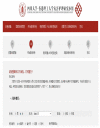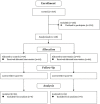The effectiveness of an on-line training program for improving knowledge of fire prevention and evacuation of healthcare workers: A randomized controlled trial
- PMID: 29975723
- PMCID: PMC6033414
- DOI: 10.1371/journal.pone.0199747
The effectiveness of an on-line training program for improving knowledge of fire prevention and evacuation of healthcare workers: A randomized controlled trial
Abstract
Background: Hospitals are vulnerable to fires and the evacuation process is challenging. However, face-to-face fire prevention and evacuation training may take healthcare workers' time away from patient care; therefore, effective on-line training may be warranted. We carried out and examined the effectiveness of an on-line education and training of fire prevention and evacuation training for healthcare workers in China by a randomized controlled trial using convenience sampling from five public hospitals in China.
Methods: A total of 128 participants were recruited between December 2014 and March 2015. The authors built a webpage that included the informed consent statement, pre-test questionnaire, video training, and post-test questionnaire. After completing the pre-test questionnaire, participants were randomly assigned to watch the intervention video (basic response to a hospital fire) or the control video (introduction to volcanic disasters). A 45-item questionnaire on knowledge of fire prevention and evacuation was administered before and after the video watching. This questionnaire were further divided into two subscales (25-item generic knowledge of fire response and 20-item hospital-specific knowledge of fire prevention and evacuation). One point was awarded for each correct answer.
Results: Half of the participants (n = 64, 50%) were randomized into the intervention group and the remaining 64 (50%) were randomized into the control group. For generic knowledge of fire prevention and evacuation, those in the intervention group improved significantly (from 16.16 to 20.44, P < 0.001) while the scores of those in the control group decreased significantly (from 15.27 to 13.70, P = 0.03). For hospital-specific knowledge of fire prevention and evacuation, those in the intervention group (from 10.75 to 11.33, P = 0.15) and the control group (from 10.38 to 10.16, P = 0.54) had insignificant change. For total score, those in the intervention group improved significantly (from 26.91 to 31.77, P < 0.001) while those in the control group decreased insignificantly (from 25.64 to 23.86, P = 0.07). After the intervention, the difference between the scores of the intervention group and the control group on all three knowledge areas of fire prevention and evacuation (generic, hospital-specific, and total) were significant (all Ps < 0.05).
Conclusions: An on-line fire training program delivered via educational video can effectively improve healthcare workers' knowledge of fire prevention and evacuation.
Trial registration: Clinicaltrials.gov NCT02438150.
Conflict of interest statement
The authors have declared that no competing interests exist.
Figures
References
-
- Chinese emergency equipment website. Fire knowledge and definition 2016 [cited 2016 14 Sep]. Available from: http://www.chinayjzb.com/yingjizhishi/ (Archived by WebCite at http://www.webcitation.org/6kVTdvQbX).
-
- Kelly FE, Hardy R, Hall EA, McDonald J, Turner M, Rivers J, et al. Fire on an intensive care unit caused by an oxygen cylinder (correspondence). Anaesthesia. 2013;68:102–4. - PubMed
-
- Su X, Zhang Y. Hospital fire risk factors and control measures (In Chinese). Prac J Med Pharm. 2014;31(1):94–6.
-
- Miles LF, Scheinkestel CD, Downey GO. Environmental emergencies in theatre and critical care areas: power failure, fire, and explosion. Continuing Educ Anaesth Crit Care Pain. 2015;15(2):78–83.
-
- Song HX. Behind the Fire of Liaoyuan Central Hospital (In Chinese). Labour Protect. 2006;4:26–8.
Publication types
MeSH terms
Associated data
LinkOut - more resources
Full Text Sources
Other Literature Sources
Medical



